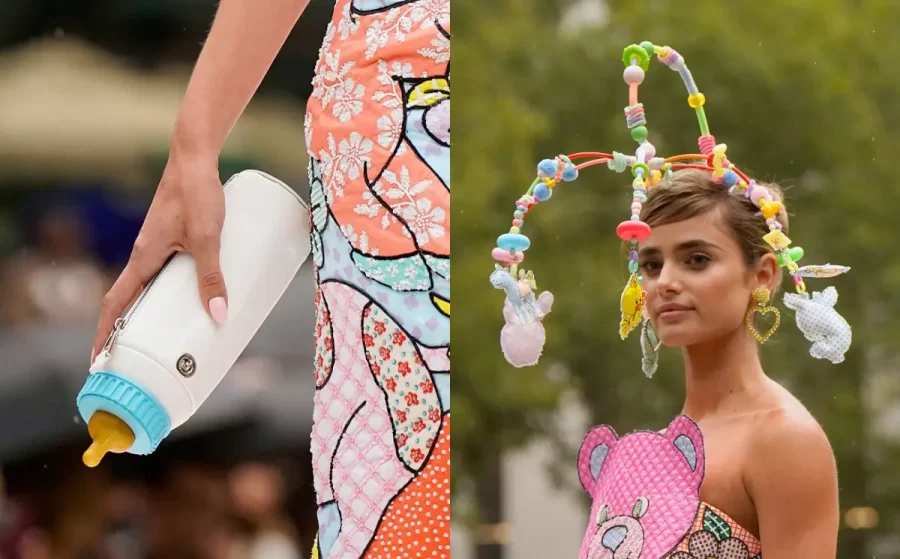Moschino Spring 2022 Collection Infantilizes Women
September 30, 2021
New York Fashion Week Spring 2022 began on Sept. 7, and with it, plenty of questionable collections. One fashion line that certainly raised eyebrows emerged from Moschino, an Italian luxury fashion house.
Moschino revealed its Ready to Wear Spring 2022 collection on an outdoor runway in New York City’s Bryant Park. In this new collection, it showcased pastel power suits, quilted patterns, and baby motifs. Essentially, it combined women’s fashion with nursery rhymes. This baby-themed fashion show alludes to infantilization, which is a serious topic that needs to be put up for discussion because it equates femininity with submission and vulnerability.
Infantilization is the treatment of an individual who has a greater mental capacity than that of a child, and yet, is being regarded as though they were a child. Women are the recurring victims of infantilization, which is a concept that has persisted for many generations. It also highlights how the concepts of youth and innocence in women are sexualized, such concepts center around placing women in a subordinate position that is asserted by male dominance.
Moschino’s collection purposefully accessorized their models with equipment that symbolized aspects of childhood. Gigi Hadid, one of the highest paid models in the American modelling industry, carried a baby bottle as a purse, and pretended to drink out of it at the end of the runway. Additionally, Taylor Hill, an American model and actress, wore a baby mobile atop her head. Yes, that is correct. She wore a baby mobile as if it were a hat. Moreover, most of the models ended up sporting a wrist of plastic, baby toy bracelets. While some may argue these pieces are merely fashion statements, these very fashion statements perpetuate harm as they directly associate women’s fashion with infancy, promoting the idea that women should assume a childlike, docile position.
According to People, Moschino’s creative director Jeremy Scott said, “It’s very ladies who lunch, but it’s also nursery rhymes, so it’s baby lady.”
By labeling this collection as “baby lady,” Scott is insinuating that women should be treated like children. It alludes to the patriarchy in which women are infantilized in order to be seen as subordinates to men, some of whom have this toxic trait of wanting to be in the position of dominance and power. Scott may not be directly asserting that infantilizing women is acceptable; however, his words speak for themselves.
Furthermore, Vogue wrote, “His tailoring was cut to seduce with cropped jackets and short, fitted skirts, so why the toy elephants, giraffes, and seals prancing across the quilted satin and tweed?”
Vogue makes it evident that Moschino took liberty in creating silhouettes that showed off the female body with their word choice of “seduce.” The inclusion of baby motifs taken in combination with the fitted clothing and children’s accessories obviously alludes to infantilization.
This baby-themed runway show clearly borderlines simply being kitsch and infantilizing women, with more precedence on the infantilization side of the debate. However, some people are dismissing Moschino and Scott’s decision to make a nursery rhyme collection with the excuse that it is “camp.”
In the fashion and entertainment industry, camp is a style that is overly exaggerated and almost artificial. It is used to describe fashion in a humorous way because the design is so excessive and overdone.
However, the idea of a collection being camp should not be used to excuse this fashion line that subtly implies a connection between women and children. Collections can still be considered camp without the use of baby-themed 3D giraffes, squirrels, and bears plastered all over the outfits. For example, Rei Kawakubo’s work. Rei Kawakubo designs collections that honor the human spirit without utilizing childlike motifs.
Infantilization should not be taken lightly, and Moschino’s spring 2022 collection was clearly a nod towards the wrongful portrayal of women as children.
Photo courtesy of MOSCHINO

